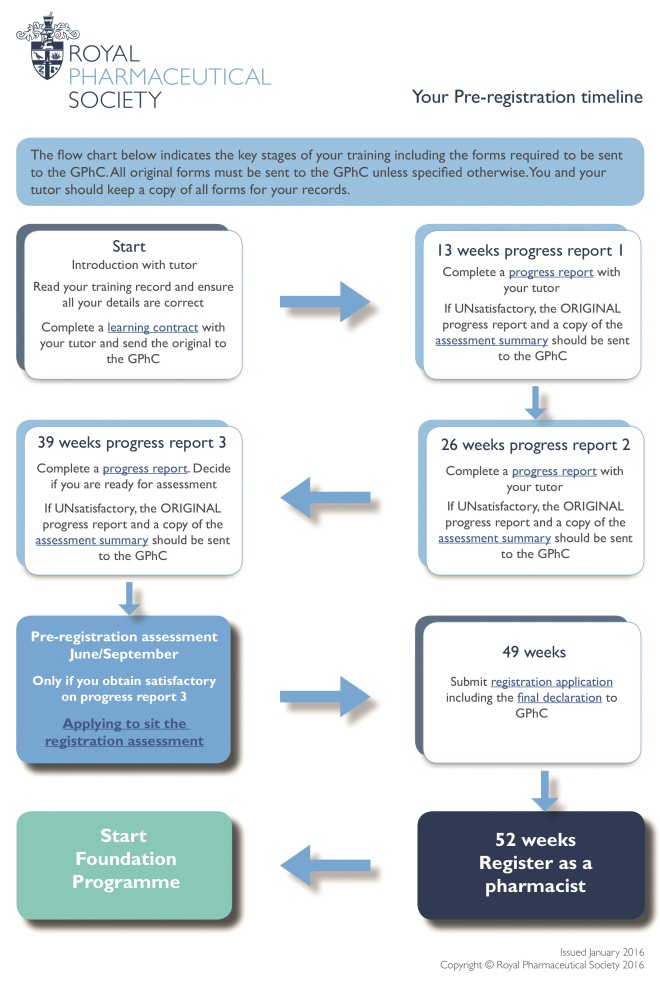
Shutterstock
Graduating from university is a huge achievement, but it is only the first step on your career pathway and you need the right support tailored to you and your personal professional development needs.
Regardless of the sector you now work in, your undergraduate degree has equipped you with the knowledge and skills that you will need as a pharmacist. Preregistration (prereg) is the time to practise these in real life, but with supervision. It can be daunting, but it is the best time to develop your professional practice from a clinical, professional and scientific perspective.
The RPS is here to support you throughout your prereg training and onwards as a pharmacist, including one-to-one support, advice on standards and guidance, professional development and much more.
Your development programme: RPS pre-foundation
Professional development is at the core of pharmacy and it is important to hone those skills from an early stage. The RPS pre-foundation programme provides tailored guidance and support from the final year of the MPharm degree until the end of prereg. It provides a structured framework with portfolio, mentoring, resources and tools to work towards your professional development and prepare you for the transition to Foundation level.
Elements of the programme are being developed by the RPS and the British Pharmaceutical Students’ Association (BPSA), so now is the perfect time to get involved.
Professional support
The preregistration hub offers RPS members essential advice and resources for every step of their preregistration training, including when to have your one-to-ones with your tutor and when to apply to sit the prereg assessment. Expert guidance is also available in the form of Medicines Ethics and Practice (MEP). MEP is a key resource when it comes to decision-making at work; it offers support with day-to-day practice rather than just legal requirements. The RPS reclassifications hub also includes guidance on medicines which have changed from prescription-only status (POM) to Pharmacy (P), which is useful in practice as well as when preparing for the exam.
The RPS also runs exam preparation courses, with a two-day revision course, mock exam event and 30 days’ free access to the online revision site ONtrack. If you do have to re-sit the GPhC registration exam then have a look at the Re-sitting the GPhC registration assessment guide, which has practical tips on revision and help for your next steps.
The professional support team receives thousands of queries a year from preregs, not only about daily practice but also about their relationship with their tutor and dealing with difficult situations. Make them part of your own team for any professional help you might need: they are all expert pharmacists themselves.
Prereg tutor
“Tutors are not just a trainee’s educational supervisor. They’re also mentors, coaches, role models and often line managers to their trainees. This adds complexity to the role, and it’s important for tutors to complete additional training to ensure they have the necessary skills to support their trainees throughout the year. I enjoy tutoring as it keeps me on my toes. I never know when I’ll be asked a question about what or why I’m doing something in a particular way. The RPS has a wide range of excellent resources for both pre-regs and tutors, including quick reference guides and revision course weekends to help with exam preparation.”
Simon Harris MRPharmS — education and training lead and preregistration training manager at Green Light Campus and Pharmacy; Honorary Lecturer at UCL, Centre for Postgraduate Pharmacy Education (CPPE) events tutor and RPS preregistration revision course tutor.
Audit, research and evaluation
Research is often one of the more daunting parts of your prereg year. Most pharmacy degrees require students to undertake research at an undergraduate level although with exams, coursework, the new (or different for some) working life, your research skills can get forgotten. However, now more than ever and as pharmacists of the future, showing the value of pharmacy and providing evidence of the importance of pharmacists’ roles is vital.
Research and evaluation is a key aspect of pharmacy practice, which is why you are asked to participate in a quality improvement process — e.g. a small audit — during your prereg, and be able to interpret and use research-based evidence in your daily practice. Professionals need to develop and integrate research and evaluation skills into practice from an early stage.
The RPS has developed a Clinical Audit hub which provides a quick refresher set of resources and offers a handy toolkit with ideas and resources to use when conducting an audit. Further research and evaluation guidance and one-to-one support is also on offer, including an introductory research and evaluation handbook, quick reference guides and research mythbusters.
Research during the preregistration year
“My involvement in research during my preregistration year has been unexpected but in the end proved to be fruitful. It all started when I had to choose a topic for the audit project. Luckily, my tutor was open to letting me choose a topic of personal interest, “the Concomitant use of PPIs and clopidogrel in primary care”, which is also extensively applied in clinical practice. Undeniably, my tutor’s support throughout the project was crucial — from providing a flexible schedule to allowing specific time allocation for my data collection. Upon further interest in research, I decided to submit an abstract of my audit and was pleasantly surprised when my project’s findings led to the production of a poster which was later presented at the annual Clinical Pharmacy Congress (May 2017). The Royal Pharmaceutical Society’s online resources proved very informative for writing up my project and I wish I’d known about them sooner.”
Afroditi Papachristou ARPharmS, Preregistration Pharmacist, Northway Pharmacy, Frosts Pharmacy Ltd, Oxford
Support across the sector
The RPS supports pharmacists across all sectors, through guidance and online networks which allow members to stay up to date with developments and new resources, seek support and participate in peer-to-peer discussion. The Industrial Pharmacy Network is one example of an RPS online network, and acts as the home of industry-based pharmacists and pharmaceutical scientists.
The RPS prereg online network is another place where trainees can seek help, support and discuss prereg matters.
Prereg trainees in any sector can also request a mentor by contacting the RPS Support Team.
The RPS is here for you on your professional development pathway from the pre-foundation stages during your MPharm degree and preregistration training to your early career as a Foundation Pharmacist and following that throughout your career as a pharmacist by providing continuous support as part of the Faculty programme. So why not invest in your pharmacy career by joining the RPS today?

The Preregistration timeline
Source: Royal Pharmaceutical Society (RPS)
You’re not alone: support is available through all the key stages of the pre-registration pathway
Top ten RPS resources for preregistration trainees:
2. Medicines Ethics and Practice (MEP)
5.
BNF and
BNF for Children (free for prereg members)
8. Research & Evaluation guidance
9. Mock exam and revision course and other support throughout prereg
10. RPS networks


